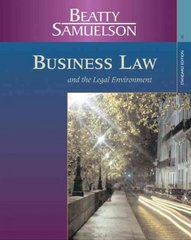Question
Suppose an Inspector at a shipping port is checking for counterfeit goods. The Inspector confronts an Owner of three shipping containers. The containers are labeled
Suppose an Inspector at a shipping port is checking for counterfeit goods. The Inspector confronts an Owner of three shipping containers. The containers are labeled A, B, and C. Both the Inspector and Owner know that one of the three shipping containers has counterfeit goods. The Inspector does not know which container has the counterfeit goods but knows that each container has the same chance of containing the counterfeit goods. Prior to the Inspectors arrival, the owner randomly chose one of the containers to place the counterfeit goods in. Per company policy, the Inspector can only request that the Owner open one of the containers to inspect. If the Inspector successfully finds the counterfeit items they receive a payoff of 10 and if they fail to find the counterfeit items they receive a payoff of -10. The Owner receives a payoff of 10 if the Inspector does not find the counterfeit goods and a payoff of -10 if the Inspector finds the items. Suppose the Inspector chooses container B. However, before opening container B, the Owner instead opens container A. The Owner shows the Inspector that inside container A there are no counterfeit items. The Owner then asks the Inspector if they would like to request that the Owner open container C instead of B.
- Use game theory to show whether the Inspector would maximize their chance of finding counterfeit items by opening container B or switching to container C. What is the expected payoff for both the Owner and Inspector for each choice?
Step by Step Solution
There are 3 Steps involved in it
Step: 1

Get Instant Access to Expert-Tailored Solutions
See step-by-step solutions with expert insights and AI powered tools for academic success
Step: 2

Step: 3

Ace Your Homework with AI
Get the answers you need in no time with our AI-driven, step-by-step assistance
Get Started


